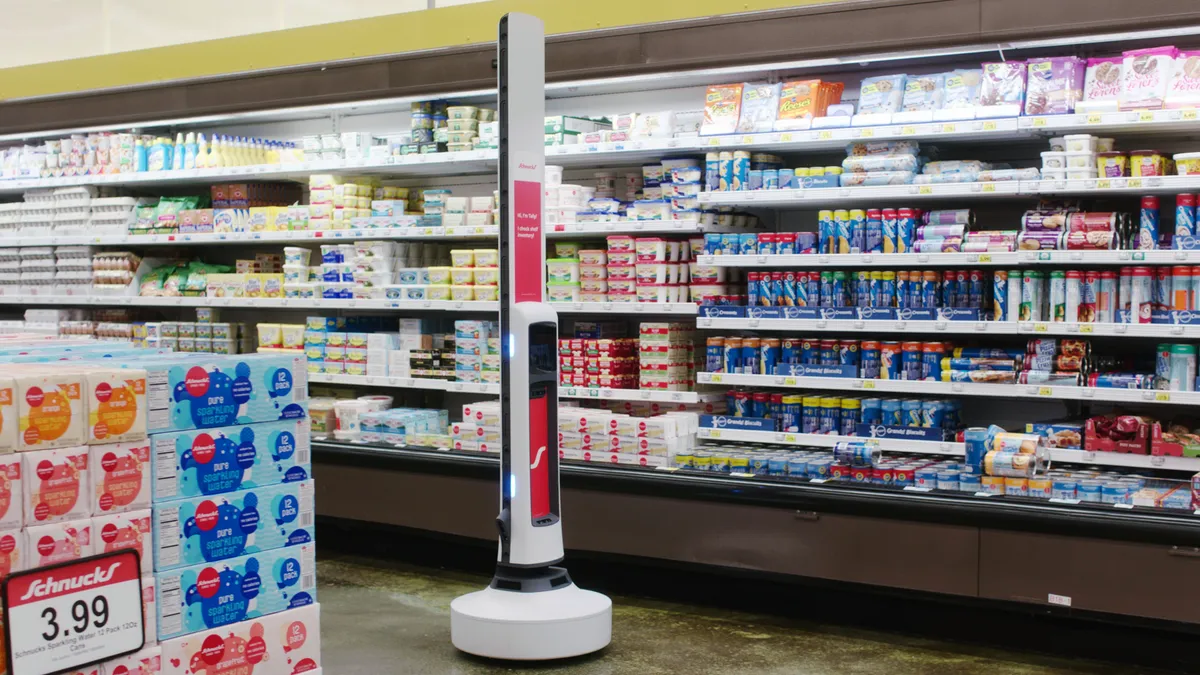When Brad Bogolea was looking to take his career developing instrumentation for power companies in a new direction, he found inspiration in a universal frustration for consumers: walking into a grocery store to buy something and discovering that the item is out of stock. Why not apply the concepts he had worked on to help utility companies remotely monitor electricity grids for interruptions to empower retailers to spot gaps on their shelves long before a human worker or customer discovered that something was missing, he wondered?
Bogolea went on to co-found Simbe Robotics, a California-based company that provides retailers with autonomous vehicles that track inventory in stores and alert workers when a product is running low. The mobile robots, known as Tally, use artificial intelligence-driven imaging technology known as computer vision to record and assess conditions in aisles as they roll around stores.
“I had this ‘aha!’ moment where [I realized that] this world of retail is unique,” said Bogolea, Simbe’s CEO. “It provides food every day for everyone on the planet — but yet this is an environment that we haven’t really instrumented, and folks don’t always know what’s happening on the store shelf.”
Today, about 1,000 Tally robots are on duty in stores operated by a variety of retailers, including Schnuck Markets, SpartanNash and BJ’s Wholesale Club as well as retailers in four countries other than the United States, according to Bogolea.
In July, Simbe rolled out technology that enables grocers to remotely monitor their stores on mobile devices and desktop computers using images collected by Tally robots — expanding on Bogolea’s vision of using technology to allow retailers to act on developments in their stores from anywhere just as electricity distributors track their networks from afar.
The new system “literally allows you to walk the store much like you would in Google Street View and not only see what’s on the shelves, but everything in between,” Bogolea said. “Customers like the ability to be omnipresent in all stores at any time.”
Bogolea reflected on Simbe’s mission of using robotics and AI to automate grocery store operations in a recent conversation with Grocery Dive.
This interview has been edited for length and clarity.
GROCERY DIVE: What made you realize now was the time to do more with your technology?
BRAD BOGOLEA: There are some retailers that are like, “Simbe, we know what data you’re capable of capturing. We would just love to have [easier access to] that data.” And there are other retailers that really look for us to provide the soup to nuts around the entire experience against this data. We saw the unique opportunity to just really lean in here and provide our partners with a really rich set of tools, and [with] the speed at which we can move a company, we’ve just been able to rapidly develop additional features.
How have advances in mobile technology affected your approach to store automation?
So much of the world of retail operates around [proprietary handheld devices], but if you’re a regional manager, a district manager, you’re not always carrying a handheld with you. So by having the ability to provision applications directly on their phone, where they’re doing other corporate tasks like email, they know before they ever walk into a store what that store looks like.
You announced a major update to Tally back in 2020, when you introduced Tally 3.0. How have the devices changed since then?
The biggest changes have really been about us just getting into additional formats and spaces, like the club retailer environment, but Tally is [mostly] the same as what we were essentially putting into grocery stores [a few years ago]. Certainly there have been small, incremental hardware revisions. But seven or eight years of development went into that platform, and we knew we could take it to really any retail environment that was larger than a convenience store.
What we’re really talking about here is, “How do we become a better partner to our retailers around engaging them with data, building deeper business intelligence tools and putting greater information in the palms of these folks’ hands?” Given we had a lot of early adopters, there were a lot of people that were just kind of running with our data, but we had the vision to say, “We can do a lot more and provide you much greater analytics.”
How would you describe Simbe’s trajectory over the past few years?
Since just prior to the pandemic, our business has grown about 28X [in terms of robots in the field]. It gives you a sense of scale that this type of application is really becoming ubiquitous across these types of customers and segments, and we’ve moved now from the early adopters into the early majority, and starting to see much deeper tipping on the scale.
How is Simbe poised for growth going forward?
Our business has tripled year over year [in terms of robots that are in use], and from January of last year to this past January, we tripled on a contract basis. Year to date alone, we’ve executed six retailer relationships, and a number of the six are major grocers.
Do you expect to see generative AI further advancing Simbe’s technology?
The world of generative AI is incredibly dependent on accurate information and data. And so the data set that we’re building becomes an incredible foundation for these types of generative applications at all levels within the retailer. And that’s really exciting.
We’re extending generative capabilities on top of what we’re building. I’m a regular user of ChatGPT and see the power of these tools.





















